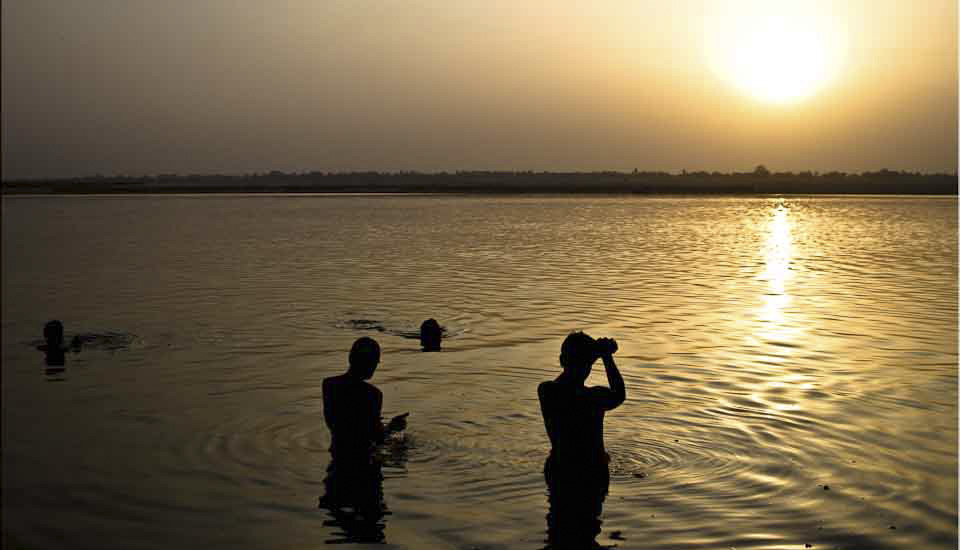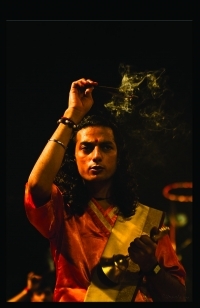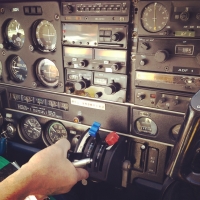.jpg)
Hamar Man
The Hamar people of Ethiopia’s Omo Valley carry themselves with a regal bearing, and meet strangers with a clear and direct gaze.
It is hot, and arid, and a long way from anywhere.
The harsh environment is at least part of the reason why the 16+ ethnic groups who live in the far reaches of Ethiopia’s Omo Valley, near the border with South Sudan, have been left alone to maintain their traditional lifestyles and cultural practices.
One writer has called the Omo Valley a “cultural melting pot”, but this is misleading. They have not blended or melted: their cultures have stayed as sharply differentiated from ours – and from those of each other – as shards of coloured glass. While they are predominantly pastoralists, or agro-pastoralists, who value their livestock (mostly cattle, goats and sheep) above all else, each tribe has their individual traditions, clothing styles, and customs. More importantly, each ethnic group has its own defined territory in the Southern Nations, Nationalities, and Peoples Region (SNNPR) of Ethiopia and speaks its own language – with linguistic roots in one of three distinct language families.
The Hamar are among the most recognisable of these tribal groups: as I’ve said previously (A Visit to a Hamar Village), they are a tall and good-looking people. The women decorate their hair with ochre-butter, and wear shell-beaded goat-skin bibs for special occasions; the men wear distinctive feathered clay caps, and carry their small wooden stools/pillows with them as they go about their business – often with an AK47 slung over one shoulder; and all: men, women and children, wear multiple strands of colourful beads.
I visited the Hamar people on a number of occasions with photographer Ben McRae, as part of a small-group Piper Mackay Photo-Tour. These environmental portraits are from a village near the market town of Turmi where we participated in the “pay-per-click” photo-tourism common in the Omo Valley: the tribes here trade on their distinctive appearances to supplement their incomes.
In theory, this is a win-win system: we visitors pay for the privilege of making photographs. In practice, I found it extremely transactional: it was hard to have natural interactions with the local people when they were making sure we didn’t ‘sneak’ any unpaid shots of cows or fences. I felt like I was collecting ‘head shots’ rather than making connections or gaining any real insight into people’s lives.
But, I tried.
Come meet some Hamar people.
.jpg)
Mother and Child
The family compound of round, woven houses is surrounded by a simple wooden fence. The mothers – in their blankets and beads – are proud to show off their babies. Naturally, we pay extra for the children in the photos!
.jpg)
Hamar Woman
The metal necklaces on this woman tell us she is married; men can have as many wives as they can afford – payed for in goats, cattle and guns.

A First Wife
This woman wears a burkule or binyere: a leather and metal necklace with a large cylindrical detail on the front. This indicates she is her husband’s “first wife”: a position of status in the community.

First Wife and Child
Infants and toddlers are everywhere. Up until recent times, children with perceived physical abnormalities were judged to be Mingi, or ritually impure, and were killed or abandoned to die.

Young Woman with Attitude
These women seem to have such confidence, …

Young Hamar Woman
… and face the camera win an insouciance that is enviable!

Young Hamar Man
Traditional hairstyles take a variety of forms, …

Man with a Watch and a Stick
… but it is the outfits …

Tommy Hilfiger and Beads
… that truly give pause.

Layered Beads and a Close Shave
Patterned head-shaving is popular, and if I were to go back to the region, I’d take spare razor blades, as they are highly valued.

Blanket and Attitude

Traditional Goatskin Smock

Woman Carving a Gourd
Everyone has something to do: this married woman in a traditional goatskin smock is preparing a gourd which will probably be used to contain coffee.

Child with a Child
As is the case in many traditional communities, children often care for their younger siblings.

Young Girl in Profile
This adorable young girl was raking in the cash; …

Young Hamar Girl
… she has an infectious smile, and we all wanted her picture!

Hamar Man in Profile
I’m in awe of those chiselled cheekbones! It’s hard to know where the sculpted hair stops and the feathered clay cap begins; …

Man’s Cap
… traditionally, men wear painted clay caps which are decorated with precious feathers and other ornaments.

First Wife
A ‘first’ and chosen wife, in her heavy – and heavily symbolic neck adornments – …

Hamar Woman
… shows us her goatskin clothes: richly decorated with colourful beads …

In Full Dress
… and cowry shells – which symbolise womanhood, fertility, birth, and wealth.

Uncompromising Young Woman
These women have strength! They look into the camera with no compromise.

Those Eyes!
This young girl (whose picture I have shared before), on the other hand, had such large, emotive eyes, she made me think of those dreadful velvet paintings of large-eyed-children with teardrops that were so popular in my youth.
I’ve left a lot of ‘background’ in my shots because I want to convey some of the dusty, hot environment in which these people live.
 But, I don’t for a moment pretend I understand how they do it! I can only hope I left more than I took.
But, I don’t for a moment pretend I understand how they do it! I can only hope I left more than I took.
Until next time,
Happy Wandering!
Pictures: 16October2018



























.png)


[…] where our base was in Turmi. Over the next days, we visited Hamar (e.g.: Visit to a Hamar Village, Face in a Hamar Village; Hamar Village Portraits; and Morning Portraits), Daasanach (see: A Visit to the Daasanach) and […]